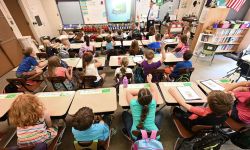Opinion | Quality distance learning, including summers, essential for students

It’s hard to plan for the future when our state, our nation and our world are fighting the COVID-19 pandemic. But when it comes to the education of Michigan’s children, we must move now, boldly and with purpose, to ensure the closure of schools this spring and anticipated financial problems our state will face don’t handicap the future of 1.5 million students in grades K-12.
Gov. Gretchen Whitmer is facing very difficult decisions as she works to figure out the best way to help our children regain traction this summer and decide when buildings reopen. We commend her for reaching out to talk with many groups and experts — in business, education, labor, academic and more — as she looks for the best path forward.
The stakes for vulnerable students could not be higher. Students from low-income families, students of color, students with disabilities, English learners, and those in foster care or who are homeless have long been underserved and often left behind. Between under-resourced schools and often with less advantage at home, such as lack of access to technology devices and internet, these students are at high risk for even greater learning loss and wider academic gaps due to this crisis.
This means we need to be prepared for a major new investment in schools and to rethink how our education system is set up. We need to address the discrepancies in equitable funding that lead to less opportunity and fewer supports for students with the greatest need. To get there, we need to follow three important steps.
First: Invest and invest more now. That will not be easy. But it is vital if we truly care about our future.
As federal policymakers allocate federal stimulus dollars to invest in K-12 schools, making the most of these investments will be critical to both addressing immediate needs and long-term challenges. Successful states — led by Massachusetts, an international education leader — also are providing state leadership by weighting students’ and communities’ needs as they allocate targeted resources through innovative new school funding approaches. If Michigan fails to think long term about every investment, the impact of dollars spent will quickly fade and urban, rural and working-class students will yet again will find themselves falling behind those who happen to live in affluent districts.
Second, be strategic. We know Michigan students already are academically behind their national peers. Recent data show 54.9 percent of Michigan third-graders do not read at grade level; 64.3 percent of seventh-graders were below grade level in math. Proficiency rates are even lower for vulnerable students across the state. What we have been doing has not been the most effective.
State leaders must step up and provide a plan for high-quality, consistent distance instruction aligned with college- and career-ready standards and ensure this instruction is available in all of Michigan’s districts. In addition to expanded day options, we suggest districts offer rigorous, academic summer instruction for at least the next two to three summers so students can recover the COVID-19 learning loss that is happening now. Parents should be strongly encouraged to have their children take advantage of robust extended day and summer school opportunities.
Educators, also, should be given financial incentives to take on teaching summer classes and additional responsibilities. School districts can take advantage of this opportunity to strengthen the quality of teaching and learning, and begin to address technology training gaps for educators. Summer reading institutes – that provided both instruction to students and best practice literacy training to teachers delivered by the state’s most effective teacher-leaders — should become common.
We also need to continually assess student learning to help parents and teachers know how their children are performing compared to others around the state and nation. This will keep pressure on the system for continual improvement, but will require Michigan to invest in standards-aligned benchmark assessments that can be flexible and taken at home, as this crisis continues.
High school students need to be prepared for their next steps, too, whether that’s college or a certificate or apprenticeship program. We must boost counseling assistance that encourages students to fully explore all their options, support less affluent students to have the same opportunities as wealthier students and fund the cost of postsecondary remediation, so our graduating high school students don’t pay for the price of COVID-19.
Third, educators and district leaders should be delivering a message of inclusivity, compassion and support for one another by addressing head-on the growing racism and damaging xenophobic bullying we are seeing in the wake of the pandemic. Proven tools provided by groups such as Teaching Tolerance can help. Additional student supports to meet the social-emotional needs of students and teachers will also be critical as this crisis continues and when students and teachers return to in-person class.
During this time of physical distancing, it is more important than ever that we come together to address both immediate and long-standing inequities in Michigan public education. Together, and with a focus on long-term solutions, can we truly address the inequities that continue to put vulnerable students at a significant disadvantage.
See what new members are saying about why they donated to Bridge Michigan:
- “In order for this information to be accurate and unbiased it must be underwritten by its readers, not by special interests.” - Larry S.
- “Not many other media sources report on the topics Bridge does.” - Susan B.
- “Your journalism is outstanding and rare these days.” - Mark S.
If you want to ensure the future of nonpartisan, nonprofit Michigan journalism, please become a member today. You, too, will be asked why you donated and maybe we'll feature your quote next time!




